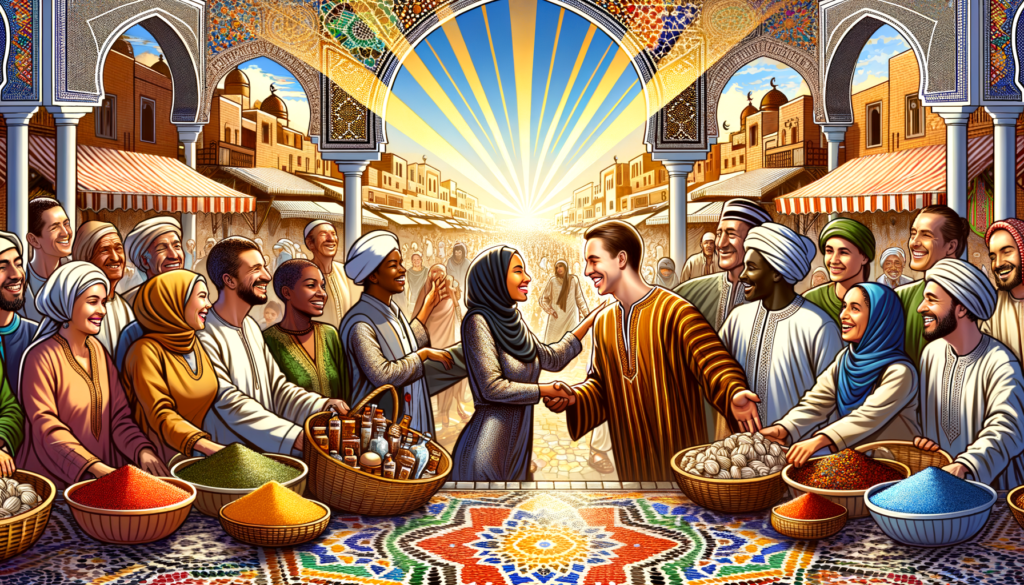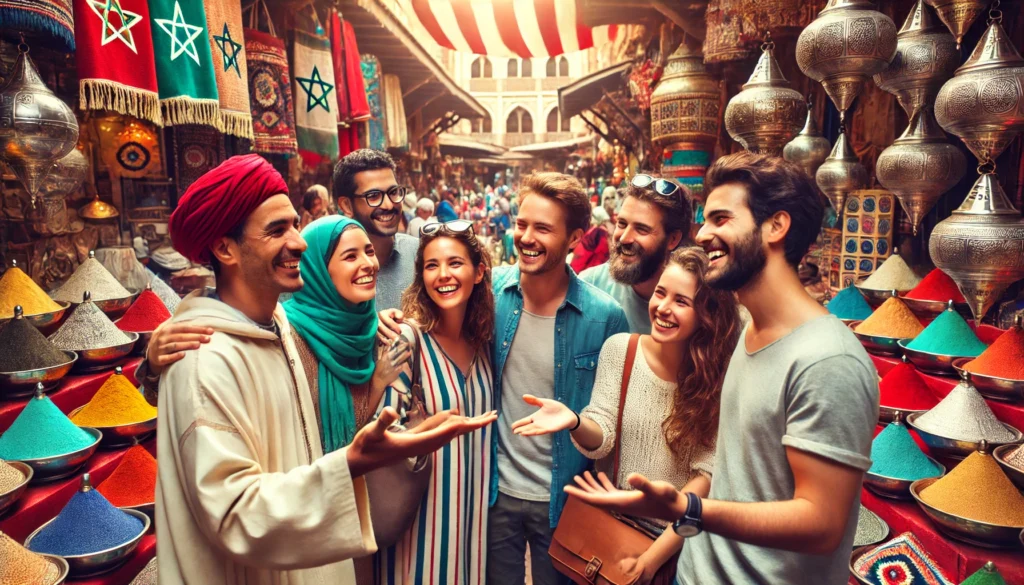
Imagine stepping into the vibrant streets of Morocco, surrounded by the bustling energy of souks, the intoxicating blend of spices wafting through the air, and the warm, genuine smiles of locals. You’re mesmerized by the colors and culture, but there’s one thing you’re unsure of—how do you greet the people who make this place so extraordinary?
In Morocco, greetings aren’t just a formality. They’re a deeply rooted cultural practice that radiates respect, warmth, and connection. From a simple hello to heartfelt inquiries about well-being, knowing how to greet someone in Moroccan Arabic (Darija) can open doors to more authentic and meaningful experiences.
Ready to dive in? This guide will teach you everything you need to know about greeting others in Darija, from general phrases to time-specific expressions and deeper conversational starters. Get ready to say hello the Moroccan way!
General Greetings
The Foundations of Moroccan Hospitality
In Morocco, greetings reflect the country’s rich sense of hospitality. Here are the cornerstone phrases you’ll need to start a friendly and respectful exchange:
The Most Common and Respectful Greeting
- “Peace be upon you” – This universal Islamic greeting is widely used in Morocco: “As-salamu aleykum”. The proper response is “Wa aleykum as-salam”.
Casual Greetings
- For informal settings, you can keep it light with a simple “Hi”, which translates to “Ahlan” or just “Selaam”.
Welcoming Phrases
- Want to make someone feel truly at home? Say “Welcome”, or in Darija, “Merhba”, with a warm smile to set the tone.
Time-Specific Greetings
Adapting Greetings to Different Times of Day
In Moroccan Arabic (Darija), greetings vary based on the time of day. Using time-specific phrases shows attentiveness and respect, which resonates deeply within Moroccan culture.
Morning Greetings
To wish someone a good morning, try phrases like:
- *Sbah elkhir*: Good morning.
- *Sbah ennor*: A more poetic way of saying good morning, meaning “Morning of light.”
Evening Greetings
In the evening, you can switch to the following common greetings:
- *Msa elkhir*: Good evening.
- *Msa ennor*: Evening of light (a polite and warm expression).
Nighttime Farewells
As the day winds down and it’s time to part ways, these nighttime phrases will come in handy:
- *Tesbah ala khir*: Good night, often said to men or in general settings.
- *Tsebhi ala khir*: Good night, specifically used when addressing females.
Asking About Well-being

Going Beyond Hellos—Connecting with People
Greetings in Darija are not just about saying hello; they often lead to checking in on someone’s well-being. Asking someone how they are helps build rapport and leaves a positive impression.
Common Questions
Here’s how to ask someone how they are doing:
- For males: *Ki dayr?*
- For females: *Ki dayra?*
Typical Responses
Common responses that you might hear include:
- *Labas, elhamdo lillah*: I’m fine, praise be to God.
- Alternatively: *Kolshi bikhir*: Everything is fine.
Additional Responses
Keeping the Conversation Rolling
Once you’ve asked someone how they’re doing, it’s important to know how to keep the conversation going. In Moroccan Arabic (Darija), showing interest in others fosters connection and warmth.
Asking “And You?”
If someone asks how you are, it’s polite to return the question. Here’s how you can say *“And you?”*:
- For males: “W nta?”
- For females: “W nti?”
Common Responses
Now that you’ve asked the other person how they’re doing, you might hear a few different answers. Some of the most common responses include:
- “Labas, elhamdo lillah” (I’m fine, praise be to God).
- “Kolshi bikhir” (Everything is fine).
Conclusion
Recap Key Points
Mastering Moroccan Arabic greetings is more than just learning words—it’s about embracing the spirit of Moroccan hospitality and showing genuine respect to locals. From general greetings to inquiries about well-being, knowing these phrases will help you connect with people on a deeper, cultural level.
Encourage Action
It’s time to put these phrases to the test! Practice saying them in authentic conversations and keep an open mind about exploring this vibrant culture.
Want to learn more about Moroccan Arabic? Check out additional resources and guides to deepen your knowledge and enhance your travel or cultural experience.
FAQ: Greeting People in Moroccan Arabic
What is the most respectful way to greet someone in Morocco?
The most respectful and commonly used greeting in Morocco is the Islamic greeting “As-salamu aleykum,” which means “Peace be upon you.” It can also be shortened to “Salam” or “Essalam.” The appropriate response is “Wa aleykum as-salam” or “Wa Aalikom essalam.”
How do you say “Hi” in Moroccan Arabic?
A casual way to greet someone is to say “Ahlan” or simply “Selaam.”
How do you welcome someone in Moroccan Arabic?
To welcome someone, you can say “Merhba,” which means “Welcome.”
What are the time-specific greetings in Moroccan Arabic?
Here are the time-specific greetings:
- Good Morning: “Sbah elkhir” or “Sbah ennor” (morning of goodness or morning of light).
- Good Evening: “Msa elkhir” or “Msa ennor” (evening of goodness or evening of light).
- Good Night: “Tesbah ala khir” (for males) or “Tsebhi ala khir” (for females).
How do you ask someone how they are in Moroccan Arabic?
To ask about someone’s well-being, you can say “Ki dayr?” for males or “Ki dayra?” for females. The response is usually “Labas, elhamdo lillah” (I am fine, praise be to God).
How do you say “And you?” in Moroccan Arabic?
You can say “W nta?” to a male or “W nti?” to a female. A common response is “Labas, elhamdo lillah” or “Kolshi bikhir” (Everything is fine).
What resources can I use to learn more Moroccan Arabic greetings?
Some helpful resources include: